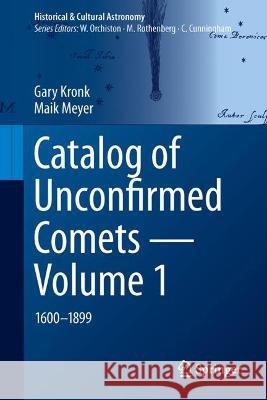Catalog of Unconfirmed Comets - Volume 1: 1600-1899 » książka
Catalog of Unconfirmed Comets - Volume 1: 1600-1899
ISBN-13: 9783031231704 / Angielski / Twarda / 2023 / 340 str.
Catalog of Unconfirmed Comets - Volume 1: 1600-1899
ISBN-13: 9783031231704 / Angielski / Twarda / 2023 / 340 str.
(netto: 764,96 VAT: 5%)
Najniższa cena z 30 dni: 693,97
ok. 22 dni roboczych.
Darmowa dostawa!
This catalog is the first in-depth investigation of comets that were reported since the 17th century, but not confirmed and subsequently lost. Volume I of this two-volume work covers objects observed between 1600 and 1899, a period that was dominated by visual observations and was experiencing a rapid evolution in science.The book uniquely combines the history and culture of comet hunting and discovery with modern tools of orbital mechanics to present a wholesome catalog of unconfirmed and suspected comets. Each case includes a presentation of the observations, a discussion about the observer (when possible), consideration of the historic context, and a conclusion as to the nature of the object. In most cases, the book presents material from original sources, including some never before published that were acquired from observatories, libraries, and historical societies around the world.Although some of these unconfirmed comets turned out to be misidentifications of planets or star clusters, fabrications, or poor observations of comets that were already being observed, the Authors did identify many objects that were likely real comets. In some cases, the Authors were even able to derive orbits for the first time. These observations may be valuable in the future, as they could prove to be observations of periodic comets still to be discovered.
This catalog is the first in-depth investigation of comets that were reported since the 17th century, but not confirmed and subsequently lost. Volume I of this two-volume work covers objects observed between 1600 and 1899, a period that was dominated by visual observations and was experiencing a rapid evolution in science.The book uniquely combines the history and culture of comet hunting and discovery with modern tools of orbital mechanics to present a wholesome catalog of unconfirmed and suspected comets. Each case includes a presentation of the observations, a discussion about the observer (when possible), consideration of the historic context, and a conclusion as to the nature of the object. In most cases, the book presents material from original sources, including some never before published that were acquired from observatories, libraries, and historical societies around the world.Although some of these unconfirmed comets turned out to be misidentifications of planets or star clusters, fabrications, or poor observations of comets that were already being observed, the Authors did identify many objects that were likely real comets. In some cases, the Authors were even able to derive orbits for the first time. These observations may be valuable in the future, as they could prove to be observations of periodic comets still to be discovered.











